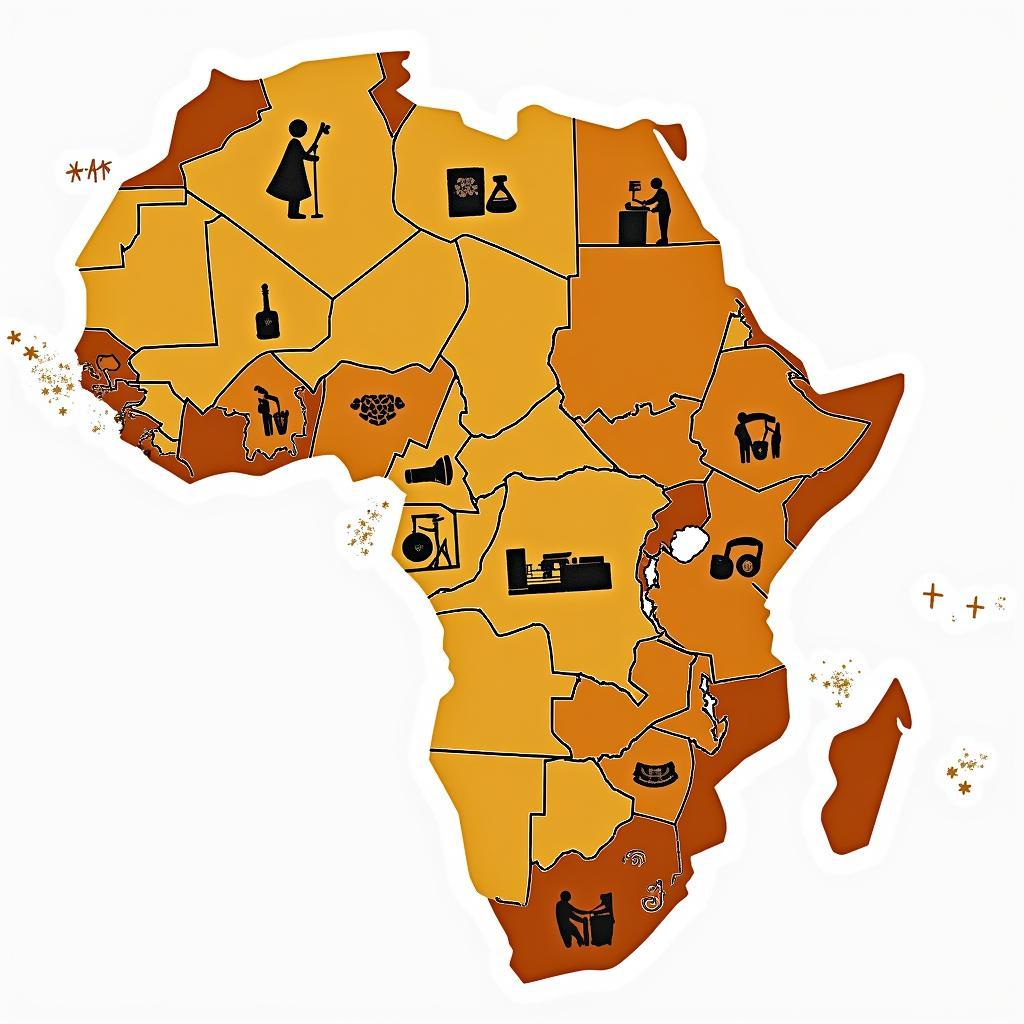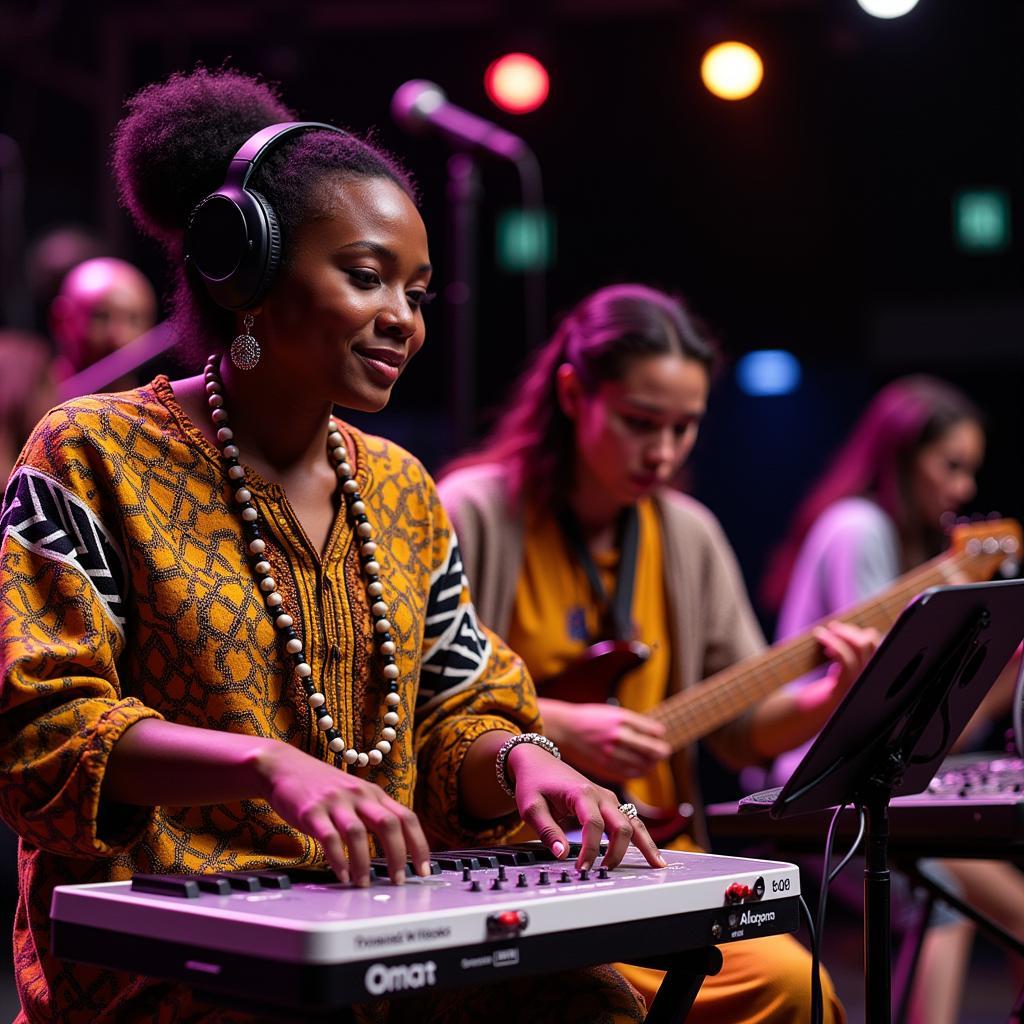A Journey Through African Folk Music History
African Folk Music History is a rich tapestry woven with the threads of diverse cultures, ancient traditions, and powerful storytelling. From the rhythmic drumming of West Africa to the melodic vocals of East Africa, the continent’s folk music reflects the soul of its people, their joys, sorrows, and deep connection to the land. This article delves into the captivating history of African folk music, exploring its evolution, regional variations, and enduring influence on music worldwide. After reading this, you will have a much better understanding of the powerful impact of African music.
The Origins of African Folk Music: A Tapestry of Ancient Rhythms
The roots of African folk music are deeply intertwined with the continent’s oral traditions. Passed down through generations, songs served as a means of preserving history, sharing knowledge, and expressing emotions. Early instruments, crafted from natural materials like animal hides and gourds, provided the rhythmic backdrop for these narratives. These early musical expressions laid the foundation for the diverse genres that would emerge across the continent. The influence of African rhythms and melodies can be heard in music around the world, demonstrating the profound impact of this rich musical heritage. What are some of the key characteristics that distinguish African folk music?
Characteristics of African Folk Music
African folk music is characterized by its complex rhythmic structures, call-and-response vocals, and the use of a wide range of instruments. Polyrhythms, the layering of multiple rhythms simultaneously, create a dynamic and engaging sonic landscape. Call-and-response, a musical conversation between a lead singer and a chorus, fosters a sense of community and participation. The diverse instruments used in African folk music, from the kora to the mbira, contribute to its distinctive sound. African american negro spirituals and slave songs provide a powerful example of the enduring influence of African musical traditions.
Regional Variations: A Continent of Musical Diversity
Across the vast expanse of Africa, distinct musical styles have developed, each reflecting the unique cultural and historical context of its region. In West Africa, the djembe and balafon contribute to the vibrant rhythms of traditional music. In East Africa, the melodic vocals of Taarab music blend Arabic and African influences. Southern Africa’s isicathamiya, characterized by its a capella harmonies, tells stories of resilience and hope. These regional variations illustrate the richness and diversity of African folk music.  Regional African Music Styles Is there a connection between African folk music and dance?
Regional African Music Styles Is there a connection between African folk music and dance?
The Intertwined Relationship of Music and Dance
Music and dance are inextricably linked in African culture. Many traditional dances are accompanied by specific songs and rhythms, creating a powerful synergy between movement and sound. Dance often serves as a form of storytelling, expressing emotions and conveying cultural values. This close relationship between music and dance further enriches the artistic landscape of the continent. African dance gif demonstrates the vibrancy and energy of African dance forms.
African Folk Music in the Modern World: A Legacy of Influence
African folk music continues to inspire and influence musicians worldwide. From jazz and blues to hip-hop and Afrobeat, its impact can be heard in a variety of genres. Contemporary artists are drawing on the rich traditions of African folk music, creating innovative sounds that bridge the gap between past and present. The enduring legacy of African folk music testifies to its power and relevance in the modern world.
Dr. Abimbola Adebayo, a renowned ethnomusicologist, notes, “African folk music is not just a collection of songs; it is a living history, a testament to the resilience and creativity of the African people.”
African bush tribes often use music as a central part of their cultural expressions. This illustrates the importance of music in preserving and transmitting cultural knowledge and values.
Professor Chinua Achebe, a respected scholar of African literature and culture, observes, “African folk music is a powerful force that unites communities and celebrates the human spirit.”  Modern African Music Performance
Modern African Music Performance
Conclusion: Celebrating the Enduring Power of African Folk Music History
African folk music history is a testament to the creativity, resilience, and cultural richness of the African continent. From its ancient origins to its modern interpretations, African folk music continues to captivate and inspire. By understanding and appreciating its history, we gain a deeper appreciation for the diverse cultures and traditions that have shaped the continent and influenced music around the globe. African american history children demonstrates how musical traditions can be passed down through generations, preserving cultural heritage.
FAQ
- What are the main characteristics of African folk music?
- What are some examples of regional variations in African folk music?
- How is African folk music used in storytelling?
- What is the relationship between African folk music and dance?
- How has African folk music influenced modern music genres?
- What are some traditional African musical instruments?
- Where can I find resources to learn more about African folk music?
Need More Help?
For further assistance or inquiries about African culture and experiences, feel free to contact us:
Phone: +255768904061
Email: kaka.mag@gmail.com
Address: Mbarali DC Mawindi, Kangaga, Tanzania
Our customer service team is available 24/7 to assist you.